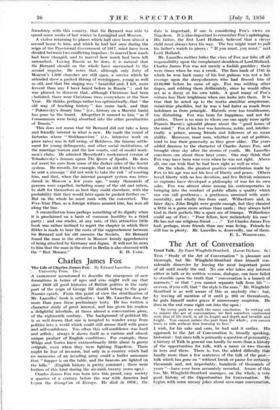-The Life of Charles James Fox. By Edward Lascelles. (Oxford
Charles James Fox
I: University Press. 15s.)
`A GEOLOGIST accustomed to describe the emergence of new formations in terms of ages and eras might well say that :since 1929 all good histories of British politics in the early part of the reign of George III should belong to the post- Namier epoch. From this point of view the stratification of !Mr. Lascelles' book is orthodox ; but Mr. Laseelles does far more than pass these preliminary tests. He has written a character study of great interest, and has given his readers a delightful interlude, at times almost a conversation piece, of the eighteenth century, The background of -political life is so well drawn that one is tempted to wander _away from Politics into a world which could still amuse itself with grace !IOW Self-confidence. Too often this self-confidence was hard ;and selfish ; always it shows itself as a curious and almost 'unique product of English conditions. For example, theSe Whigs and Tories knew extraordinarily little about la guerre integrate, even when they were fighting Napoleon. There might be fear of invasion, but only in a country which had no memories of an invading army could a butler announce that " Supper is on the table, and the beacons are lighted on the hills." , (English history is pretty constant j. there were butlers of this kind during the air-raids twenty years ago.)
Charles James Fox was born into this proud, easy society a quarter of a century before the war with America had Legun the disruption of Europe. He died in 1806; the Lord Holland.
Mr. Lascelles neither hides the vices of Fox nor fobs off all responsibility upon the complaisant shoulders of Lord Hollanii. Charles James Fox was not merely a foolish gambler ; therie were times when he was a crook. The faro bank of 1781 in which he won back many of his lost guineas was not a fair -revenge upon the sheep-shearers who had fleeced him of £140,000 before he came of age. Fox was robbing other dupes, and robbing them deliberately, since he would often act as a decoy at his own table. A good many of Fox's virtues lose-their brightness when one loOks into them. It is true that he acted up to the motto amicitiae sempiternae, inimicitiae placibiles, but he was a bad hater as much from indolence as from principle. Hatreds were too troublesome, too disturbing. Fox was born for happiness, and not for politics. There is no man to whom one can apply more aptly Francis Bacon's splendid phrase about the " good hours of the mind." Fox at his best was luminous, noble, and, intellec- tually a prince, among friends and followers of no mean ability. Moreover, most men, whether in or out of politics, tend to lose their generosity as they grovi older. The years added fineness to the character of Charles James Fox, and brought clear sky after the storms of youth. Mr. Lascelles convinces one about these later years. One may think that Fox may have been wise even when he was not right. Above all, one can wish that he had been right as well as wise.
On the whole, the greatest positive contribution made by Fox to his age was not his love of liberty and peace. Others loved liberty with no less devotion, and few British ministers or captains have developed a philosophy of war for its own sake. Fox was almost alone among his contemporaries in bringing into the conduct of public affairs a quality which one can call gentleness ; a gentleness unmixed with senti- mentality, and wholly free from cant. Wilberforce and, in later days, John Bright were gentle enough, but they cheated a little in a game more serious than cards ; they always held God in their pockets lllce a spare ace of trumps. Wilberfoice could say of Fox : " Poor fellow, how melancholy his case T. He has not one religious friend . . ." Yet Charles James Fox had, perhaps, more friends than any man living. Friends he still has in plenty. Mr. Lascelles is, deservedly, one of them.
date is. important, if one is. considering Fox's views .on Napoleon. It is ilso important to remember Fox's upliiingink. His father, the first Lord Holland, believed that a clever child must always have his way. The boy might want to pull
his father's watch to pieces : " If you must, you must," said • E. L. WOODWARD.














































 Previous page
Previous page